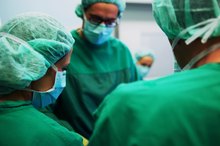What Are the Side Effects of a Colostomy Reversal?
If the bowels are injured, inflamed or parts need to be removed due to cancer, a colostomy may be necessary. This procedure involves attaching one end of the intestines to the abdominal wall. Next, an opening is made in the abdominal wall and a colostomy bag is attached, allowing the stools to empty into it. Sometimes this is a permanent operation, while in other cases the procedure can be reversed. However, before going through this operation, it is best to learn about the side effects of a colostomy reversal operation so that the right decision can be made 13. In general, the incidence of complications from this procedure can occur in 2 percent to 50 percent of all reversal surgeries, according to a 2009 article, "Stoma Reversal, A Hospital-Based Study of 32 Cases," published on the Internet Journal of Surgery 24. The risk depends on the patient's overall health and the exact type of procedure that is done.
Nausea
The benefit of having a colostomy reversal is that the intestine is reconnected to the rectum so that there is no longer a need to wear a colostomy bag 1. However, any type of surgery involves risks and after this procedure, some patients experience an upset stomach, vomiting or feeling bloated and full, claims the Drugs.com website. For some patients this is temporary and resolves on its own, while other patients may need further care or even additional surgery.
Abnormal Bowel Movements
Complications of Colostomy Reversal
Learn More
After a colostomy reversal, some patients never regain normal bowel movements, warns Gloucestershire Hospital 12. A patient may experience more frequent and looser stools, become constipated or have both. In rare cases, incontinence may develop. Bowel movements may be interrupted or irregular because the the intestine muscles weakened from not being used, inflammation or scar tissue occurred as a result of the surgery, or sometimes the intestines can become blocked.
Irregular bowel movements may eventually resolve on their own within a few months, while in other cases additional surgery may be required. While serious complications are rare, the risk is higher for the elderly, those who are overweight or anyone with a chronic medical condition. A physician can review each case individually, to determine the risks and benefits of this operation.
- After a colostomy reversal, some patients never regain normal bowel movements, warns Gloucestershire Hospital 1.
- Irregular bowel movements may eventually resolve on their own within a few months, while in other cases additional surgery may be required.
Anastomotic Leak
When the intestines are reconnected surgically, the site of the reattachment is called an anastomosis, and in some cases this area can develop a leak. If this occurs, there is a risk of developing an infection. In some cases, a course of antibiotics is all the treatment that is needed. At other times the area may need to be drained. In more serious cases, further surgery may be necessary. After any surgical procedure it is important to be on the lookout for a fever, fatigue, swelling, redness and any other sign of an infection.
- When the intestines are reconnected surgically, the site of the reattachment is called an anastomosis, and in some cases this area can develop a leak.
- In more serious cases, further surgery may be necessary.
Incisional Hernia
How to Clean a Colostomy Bag
Learn More
After a colostomy reversal there is a risk for the wound to become infected, which can contribute to the development of an incisional hernia 1. An incisional hernia is diagnosed when a portion of the intestines pushes into the abdominal cavity, and it usually requires additional surgery.
Related Articles
References
- Drugs.com: Laparoscopic Colostomy Reversal
- Colostomy Association: About Stoma Reversal
- John Hopkins Medicine. Colostomy procedure overview. Updated 2019.
- National Institute of Diabetes and Digestive and Kidney Diseases. Ostomy surgery of the bowel. Updated August 2014.
- Oncolink. Surgical procedures: colostomy. Updated November 14, 2018.
- Slone McKinney, E, James, SR, Smith Murray, S, Nelson, K, Ashwill, J. Maternal-Child Nursing. Oxford, UK: Elsevier Health Sciences; 2017.
- Northwestern Medicine. Colostomy diet guidelines. Updated April 2016.
- McKesson Provider Technologies. "Colostomy and Ileostomy." University of Michigan Health System. 11 Nov 2006.
- National Institute of Diabetes and Digestive and Kidney Diseases. "Ileostomy, Colostomy, and Ileoanal Reservoir Surgery." National Digestive Diseases Information Clearinghouse Aug 2014.
- United Ostomy Association of America, Inc. "Frequently Asked Questions Following Ostomy Surgery." UOAA 2013.
Writer Bio
I hold a Master's degree in exercise physiology/health promotion. I am a certified fitness specialist through the American College of Spots Medicine and an IYT certified yoga teacher. I have over 25 years experience teaching classes to both general public and those with chronic illness. The above allows me to write directly to the reader based on personal experiences.








